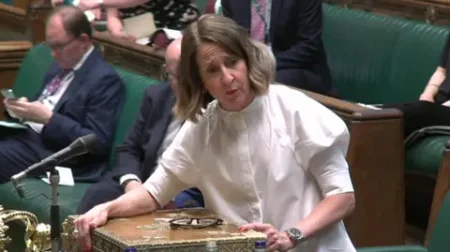In a significant move to modernize the parental leave and pay system in the United Kingdom, the government has announced a comprehensive review aimed at addressing longstanding concerns regarding the provisions available to new parents. Ministers expressed their commitment to modernizing the framework of paternity, maternity, and shared parental leave, a system that many advocate groups argue has been largely neglected and outdated for several years.
The initiative is being hailed by advocates such as The Dad Shift, which described the review as potentially the “best chance in a generation” to reform the existing systems to better serve working families. This comes in the wake of a report by a committee of Members of Parliament (MPs), which criticized the UK’s parental leave policies, deeming them “one of the worst in the developed world” and highlighting “fundamental flaws” that need rectification.
Concerns regarding the current system were echoed by Shadow Business Secretary Andrew Griffith, who cautioned that an increase in costs associated with reform might lead to job losses. He emphasized the necessity of finding a balance that protects jobs while enhancing parental leave benefits. This call for a review is partly fueled by a report from the Women and Equalities Committee, which pushed for “bold” actions to rectify existing problems, advocating that doing so will come at a significant financial investment.
Business Secretary Jonathan Reynolds contributed to the discussion by acknowledging the feedback from businesses and parents alike, all of whom have indicated the need for a serious examination of the parental leave framework. He noted, “We haven’t had a serious look at parental leave for several decades now in the UK,” stressing that the moment has come for meaningful engagement from those with strong perspectives on the matter.
The government’s review will delve into statutory leave and pay, which denotes the minimum support that employers are obligated to provide, accountable by the state. While statutory maternity leave allows most new mothers and birthing parents to take a substantial 52 weeks off work, it also links to statutory maternity pay, which is allotted for up to 39 weeks. This pay initially provides 90% of a person’s average weekly earnings before taxes for the first six weeks. Subsequently, for the next 33 weeks, the pay amounts either to £187.18 per week or 90% of average weekly earnings, whichever is lower. Notably, self-employed mothers or those earning under £125 a week are ineligible for this support.
Paternity leave, which was instituted in 2003, permits most new fathers and second parents to take only two weeks off following the birth or adoption of a child. This leave applies irrespective of gender, yet, similar to maternity leave, those who qualify receive either £187.18 per week or 90% of their earnings, whichever is lesser. In a disappointing juxtaposition, the payment equates to less than 50% of the National Living Wage for those 21 and older, presenting a significant barrier for many parents.
The Shared Parental Leave policy, established in 2014, allows eligible parents to divide up to 50 weeks of leave and 37 weeks of pay after the birth or adoption of a child. However, uptake has been notably low. The government revealed alarming statistics indicating that one in three fathers forego paternity leave due to financial constraints.
Voices from the campaign sector, such as George Gabriel from The Dad Shift, reflected optimism regarding the government’s review, which he believes can herald essential changes. Gabriel pointed out that while paternity leave initially represented a significant step forward when introduced, it has since plateaued, rendering the current system one of the least generous in Europe.
Further emphasizing the criticality of reforming parental leave was Rachel Grocott, the chief executive of the charity Pregnant Then Screwed. She argued that enhancements in parental leave policies not only have the potential to help close the gender pay gap but also to provide healthier beginnings for children. Grocott deemed investing in a modernized system as an unequivocal “no-brainer.”
As the UK embarks on this pivotal review, all eyes will be on the outcomes, especially considering the profound implications these reforms could have on families, employers, and society at large. The anticipated adjustments present an opportunity to create a more equitable and supportive environment for parents navigating the early stages of family life.











